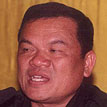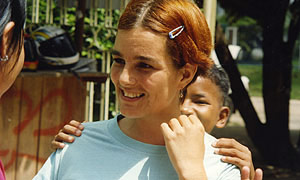Not their Prices but their Prizes (2004-Nov-09)


| LES 6 COMMANDEMENTS |
PHN@M - P@NH - P@TINS | THE 6 COMMANDMENTS |
|
Not their Prices but their Prizes (2004-Nov-09)
|

|
SRP embarks on internal reforms (2004-Nov-08)
K.I. : The opposition Sam Rainsy Party is making preparations
for a vast reform of its internal structures and organization. According
to the party leadership the reform is intended to promote "internal
democracy" by "empowering party members in
decision making processes". Party leaders, at all levels, will henceforth
be democratically elected by ordinary party members instead of being
appointed or co-opted by existing leaders. Elections will start at
the village level – all over the country – to select the very
grassroots leaders, who will in turn elect higher-level local and regional
leaders at the commune, district and provincial levels. The democratically
elected provincial and regional leaders or delegates will, at the end of
the process, elect the party's national leaders.
Party candidates for any national elections will be designated through
"primary elections" modeled on those organized in the United
States by the Republican Party and the Democratic Party. The reform,
to be implemented with the support of the Washington-based National
Democratic Institute, is presented as a "revolution"
in Cambodian politics and Cambodian traditional mentality based
on authoritarianism, paternalism and patronage, and is expected to give
birth to a "New SRP" in 2005. See first comment in Khmer at http://
www.cambodiapolitics.org/ news/ moneaksekar_youth/ november_04/ 7-8_y.pdf
.
 |
Khmerintelligence.org : On 8 September 2004, under the headline "Funcinpec heading for crisis", KI pointed to the "mounting tensions [within Prince Norodom Ranariddh's party] associated with the ongoing potentially explosive infighting related to allocation of government positions [a limited number of positions have been sold or promised to a much larger number of contestants]." |
 |
Cambodia's child sex shame (2004-Nov-04)
(By Julian Pettifer, BBC Radio 4's Crossing Continents) : After
generations of war, corruption and poverty, the sexual exploitation of
children in Cambodia has become an epidemic, and only now are a few hesitant
steps being taken to protect the young and punish their abusers. The children
of Cambodia are desperately vulnerable, and their plight has been aggravated
by the rapid growth of international tourism. Not all foreign visitors
are attracted by Cambodia's beaches and by wonders of Angkor Wat. According
to some surveys, up to 20% are sex tourists
- and among them are those seeking children. But according to Naly Pilorge
of Licadho, a Cambodian human rights organisation, it is important
not to overstate the influx of Western paedophiles as a cause of child
exploitation. Speaking to the BBC's Crossing Continents programme, she
said: "Up to 70% of our caseload for children is rape. "Mostly the perpetrators
are family members or men in the local community. Of the reported cases,
we have a small number of foreign paedophiles." Among Cambodian and
other South East Asian men, there is a strong demand for young virgin girls.
This is driven by the fear of Aids and the belief that they can rejuvenate
themselves by sleeping with a virgin. |

There is another face to Cambodia beyond the beaches and temples |

Maggie Eno and CAMBODIA'S CHILDREN How one NGO is working hard to protect vulnerable youngsters |
Collecting evidence - Most child protection
work in Cambodia has been done by NGOs and international agencies but there
are a few government initiatives as well. On the law enforcement front,
the National Police now has its Anti-Human Trafficking and Juvenile
Protection Unit, one of many institutions supported by the massive
foreign aid programme. At the unit's smart new headquarters, I dropped
in on a training course. About 40 officers, both men and women, were learning
how to collect evidence using digital cameras and then store the images
on laptop computers. All the equipment had been donated by the British
Embassy. Overseeing the project is Christian Guth, a former Chief Inspector
with the French National Police. Guth is convinced that the Anti-Trafficking
Unit is beginning to make a difference. He told me that arrests
for sexual offences have risen from virtually zero in 1997 to almost 400
last year. "More than 200 of
these were rapists," he said. "The most important issue is the rape
of children. We have cases of children aged four, five, six-years-old,
and even the case of a one-year-old baby." |
| LES SIX COMMANDEMENTS |
REFORMING OUR BUDDHISM |
GRAMMAIRE KHMÈRE |
NOVEL (Author) |
PHN@M-P@NH-P@TINS (Previous) |
| FRAN-GLO-GIBWÉ |
CAMBODIATRIBE |
GOD vs BUDDHA |
COURRI@L 2004 |